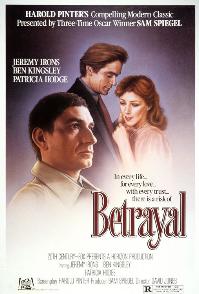| Betrayal | |
|---|---|
 Theatrical release poster | |
| Directed by | David Jones |
| Screenplay by | Harold Pinter |
| Based on | Betrayal by Harold Pinter |
| Produced by | Sam Spiegel |
| Starring | |
| Cinematography | Mike Fash |
| Edited by | John Bloom |
| Music by | Dominic Muldowney |
Production company | |
| Distributed by |
|
Release date |
|
Running time | 95 minutes |
| Country | United Kingdom |
| Language | English |
Betrayal is a 1983 British drama film adaptation of Harold Pinter's 1978 play. With a semi-autobiographical screenplay by Pinter, the film was produced by Sam Spiegel and directed by David Jones. It was critically well received. Distributed by 20th Century Fox International Classics in the United States, it was first screened in movie theaters in New York in February 1983. [1]